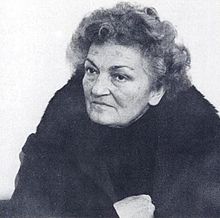|
Suso Cecchi d'Amico
Giovanna Cecchi (21 July 1914 – 31 July 2010), known professionally as Suso Cecchi d'Amico, was an Italian screenwriter and actress. She was one of the first female Italian screenwriters and helped pioneer the Italian neorealist movement. Though her screenwriting career spanned sixty years, she won the 1980 David di Donatello Award for lifetime career[1] as well as the Golden Lion for Lifetime Achievement at the 1994 Venice Film Festival.[2] Cecchi d'Amico worked with virtually all of the most celebrated post-war Italian film directors, and wrote or co-wrote many award-winning films—among them:[3][4]
She also wrote the libretto for Nino Rota's opera I due timidi and collaborated on the script of William Wyler's Roman Holiday.[2] She was a member of the jury at the 1982 Cannes Film Festival.[2] Early life and educationGiovanna Cecchi was born July 21st, 1914, in Rome. She was immediately renamed Susanna by her father, and her parents’ Tuscan heritage soon nicknamed her “Suso”. Her father, Emilio Cecchi (1884–1966), was from Florence, known for his work as a literary critic and author, but also as a film producer and director, while her mother, Leonetta Pieraccini (1882–1977), originated from Siena and was a well-known painter and writer.[5][6] Suso attended the French lycée in Rome and then proceeded to pursue higher education in Switzerland and Cambridge.[7] Upon her return to Rome, she used her proficiency in languages to secure work with the Ministry of Foreign Trade.[8] In 1932, her father returned from a two-year professorship in the United States. Having witnessed the work being done in the film industry abroad, he was made the new director of the Cines studios by the government. Here, D’Amico's exposure to the film industry began as she frequented the soundstages, familiarizing herself with the processes, crews, writers, and actors.[9][10] In 1938, she married musicologist Fedele "Lele" D'Amico, son of theatre critic Silvio D'Amico. Though Lele went into hiding during World War II due to his work for an anti-Fascist publication, the pair had three children who they themselves made significant contributions to Italian culture: Masolino, Silvia, and Caterina.[11][8] CareerWith the war to come, d’Amico left the Ministry and became a translator of literary works, all the while being asked by her father’s peers to read scripts in order to give her feedback. Later, she was asked by producer Carlo Ponti and director Renato Castellani to write one herself and her career as a screenwriter was launched.[12] Earning herself the nickname of the Grand Lady of Italian Cinema, d’Amico was a pioneer for women screenwriters and welcomed by her male counterparts thanks to the value of her input as a female perspective that was otherwise lacking in the writers’ room, she helped create and write for and about credible female characters.[13] Moreover, she proliferated during the time that Italian neorealism was being created and gaining global interest; she developed a style of writing that combined her literary education and understanding of the people, and was distinct for its succinct dialogue. She kept actors’ lines short because, true to neorealist form, they were often amateurs with little experience, and so, it was easier to keep their lines short.[8] DeathSuso Cecchi d’Amico died on July 31st 2010, in Rome. Her death was noted by president of Italy Giorgio Napolitano who stated that she was a “great protagonist of one of the best seasons of Italian cinema.”.[3][14] FilmographyScreenwriter
As actress
References
External links
|
||||||||||||||||||||
